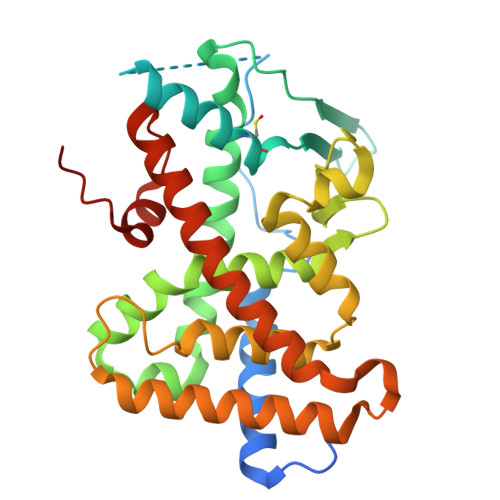Targeting pregnane X receptor with a potent agonist-based PROTAC to delay colon cancer relapse.
Bansard, L., Laconde, G., Delfosse, V., Huet, T., Ayeul, M., Rigal, E., Donati, Q., Gerbal-Chaloin, S., Daujat-Chavanieu, M., Brunel, L., Legrand, B., Chavanieu, A., Martin, A.R., Pannequin, J., Bourguet, W., Amblard, M., Pascussi, J.M.(2025) Oncogenesis 14: 34-34
- PubMed: 40885723
- DOI: https://doi.org/10.1038/s41389-025-00573-2
- Primary Citation of Related Structures:
8R81, 8R82 - PubMed Abstract:
Tumor recurrence is frequently attributed to drug-tolerant cancer cells. We previously demonstrated that downregulation of the Pregnane X Receptor (PXR, NR1I2) reduces chemoresistance and prevents colorectal cancer recurrence in xenograft mouse models. However, there is currently a lack of clinically-suitable PXR antagonists. In this study, we report the design and synthesis of a novel PXR agonist-based PROTAC (JMV7048) which promotes polyubiquitination and degradation of the human PXR protein via E3 CRBN ubiquitin ligase and 26S proteasome pathways. JMV7048 selectively degrades PXR in colon carcinoma, hepatoma, and pancreatic cancer cell lines, with no impact on primary human hepatocytes. Notably, JMV7048 reduces PXR protein expression in drug-tolerant colon cancer cells, sensitizing them to chemotherapy and significantly delaying cancer relapse in xenografted nude mice. These findings suggest that PXR-targeting PROTACs may serve as novel therapeutic agents to enhance the sensitivity of chemo-resistant cancer cells to chemotherapy.
- Institute of Functional Genomics (IGF), Univ. Montpellier, Inserm, CNRS, Montpellier, France.
Organizational Affiliation:





















